I’m not the world‘s greatest tool man, but I’m somebody’s useful sidekick. I can hit a nail on the head the majority of times I take a whack at it. I lean toward ministries that involve using hammers rather than my limited people skills. In fact, I’m the guy you’d find in the back row at an introvert convention (assuming I arrived early enough to get a seat there). But along with church building during my mission trip, I took a few whacks at building relationships as well. Both activities turned out to be well worth the effort.
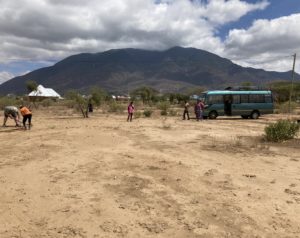
The construction work in the city of Longido started on our first Wednesday in Tanzania. Seven members of our ten-person mission team arrived by bus at a large, bare field late in the morning. On one side, a huge hole was already started. We were told it would be for the church privy. At the other side, a team of Africans was at work measuring out the site for the church. Just as the rest of us settled in to work, though, we were all called to lunch. I had had a huge buffet breakfast at the lodge earlier that morning, but I was never one to refuse food.
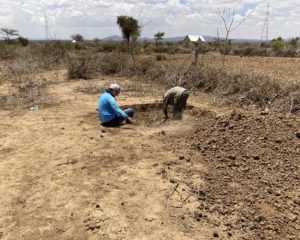
After lunch, we dug into the red Tanzanian soil. We needed 26 three-foot-deep post holes in all. It was the dry season, so the soil was hard. After we dug down a foot, it was rock hard. We used short pieces of rebar to break up the soil. One of the African team members began hauling water from some distant source. He poured it into the partially-dug holes, and we were able to loosen up another two or three inches at a time and scoop it out.
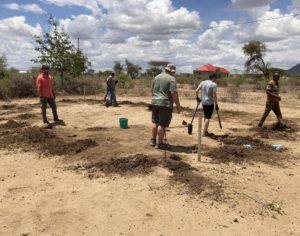
We weren’t that far from the equator, and the sun was blasting overhead. I wore a protective hat. I also slathered up from an industrial-sized dispenser of an ultra-high SPF concoction that sat close by. What rays managed to penetrate those barriers were therapeutic. I felt limber, and even my arthritis seemed to have disappeared. I figured it was probably hanging around at the airport in Amsterdam, though, waiting to rejoin me during the layover on the way home.
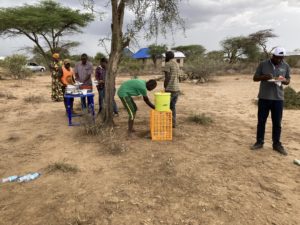
Three o’clock came and it was teatime. I was ready for a break. Even though ladies of the church had brought us a huge lunch earlier, they brought some snacks with the tea. Healthy stuff like cassava root and hard-boiled eggs. Then there were the samosas. Maybe not quite as healthy, but the best tasting of all. Some were filled with meat, others with different kinds of delicious veggies.
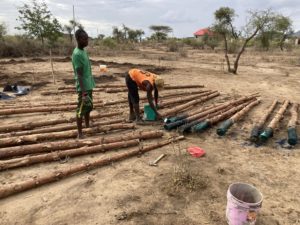
After tea, some of us continued digging while others brushed pungent purple protectorant on the bottom three feet of the posts. The lumber appeared to be some type of pine, well seasoned and very light. We had all the holes dug by five o’clock. The posts still needed to be set, but our African brothers planned to do that after we left for the day.
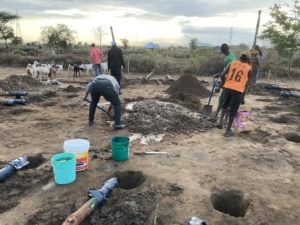
We weren’t trying to get out of work when we left early. Our guide wanted to get back to Arusha before dark. To me, driving seemed hazardous even during daylight in Tanzania, but after dark, it was crazy. I’m sure, though, that when I was younger I would have fit right in driving on these roads (if I could remember to drive on the left).
After a shower at the lodge, I went to the dining hall for the nightly buffet-style supper. I felt guilty for eating so much until I recalled that I Corinthians 9:27 tells us even the apostle Paul “buffeted” his body. I figured it was okay for me too. The chefs and waiters took care of us like family. Every chance I could, I spent time getting to know them better, learning about their interests and family members.
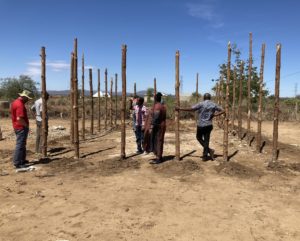
Thursday we returned to Longido, arriving earlier than the day before. The posts were already set in concrete. The Muzugus (Swahili for white guys) were impressed by the quantity and quality of the work the African team had done the evening before. We waited for the posts to set up just a bit more. I was chomping at the bit, though. I had traveled through seven time zones to build. But as soon as I finally got a hammer in my hand, tea time was announced. I should’ve seen it coming.
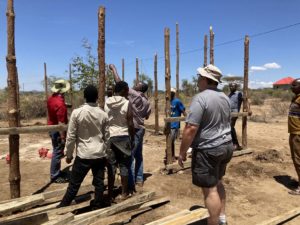
After tea, the framing started. It was interesting to watch the two teams learning to build together. We definitely had some different approaches. Sometimes we disagreed and words were exchanged. Like a good marriage, it took effort to learn to work together. I found myself at times in a role it that I’ve stumbled or wandered into many times: the diplomat.
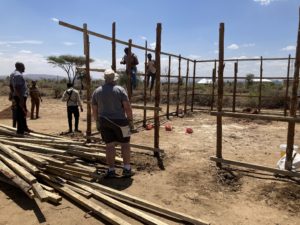
Malachi hit ten feet and was finished with the privy hole. We finished framing the sides and had most of the roof trusses assembled on the ground before we left that day. I had gotten to hammer enough to hit my thumb three times. I was a happy camper.
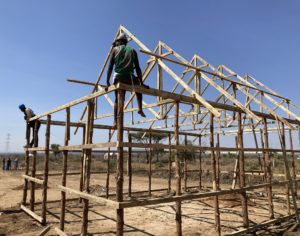
Not surprisingly, many of the trusses had already been hoisted onto the structure when we arrived Friday. The African team knew their stuff. Though Team Kentucky got to hammer some that day, our main job seemed to be keeping the home team supplied with nails and sheets of tin.
Peter used his machete to cut the tin. He didn’t swing it; rather he laid it across the tin. With an up and down wrist movement like he was opening a can, he cut across an entire piece in less than a minute. I decided that day it would be prudent never to get on the wrong side of that young man.
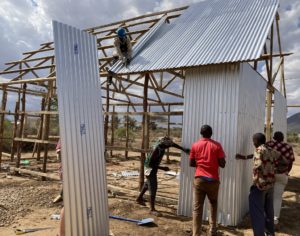
It was a long, sweat-filled day. We had our differences on the best way to attach the tin, but once again we hammered those out. As Joshua worked on the roof, the rest of use focused on the walls. We cut openings for windows, but we were told those would be filled in another time. For now the openings would do their job of ventilation. Screens might eventually be added as well. I hadn’t encountered mosquitoes on the job, but I assumed they would be prevalent during the rainy season.
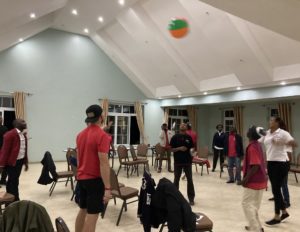
We feasted for lunch that day. The ladies of the church cut no corners. We made sure the home team filled their plates first this time, although that seemed to go against their nature. They always wanted to make sure our needs were met first. It was the same way at the lodge we stayed at. Before we left Africa we threw a pizza and prize party for the entire staff. We served them for a change. They, too, had trouble with that at first, but as the night wore on, they seemed to adjust to the switch and experience the joy of being served.
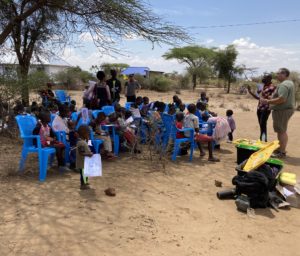
We got a lot of tin up Friday. We came back Saturday and started at it again. While some of us worked on the church, the rest gathered the children outdoors for Children’s Day. The kids listened to some Bible lessons, colored pictures, made salvation bracelets, played running games, and ate plenty of pipi (pronounced pee-pee, Swahili for candy).
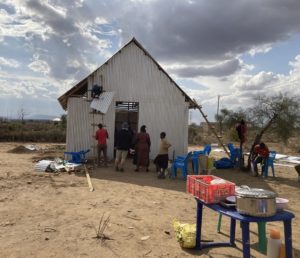
The church was finished that afternoon. The ladies of the church immediately moved inside to begin smoothing out the dirt floor. They also hung colorful banners behind the pulpit.
The church was open on Sunday as planned. Mike, of the stolen muffin, preached. I went with others to Namanga, near the Kenyan border, to take part in another service. Week two would find us building an add-on to that second church.
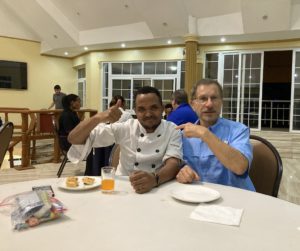
Preaching sermons, enjoying safaris, experiencing markets, driving motorcycles, building churches. All good times, but each overshadowed by rich memories of new friends made in the process—both Muzugus and Tanzanians. I am still in contact with some of the new friends I made on our mission team. I text with some of my new African brothers, including the preacher who dared ride behind me on an unpredictable motorcycle journey.
It was a joy to watch ten people from Kentucky become a team. And just as much, to be on the field building a church with the Tanzanians. We weren’t there to judge each other. We weren’t there to change each other. We were there, despite our individual differences, to serve God together. It was hard at times, but more than worth it. The proof stands strong, gleaming brightly in the equatorial sun
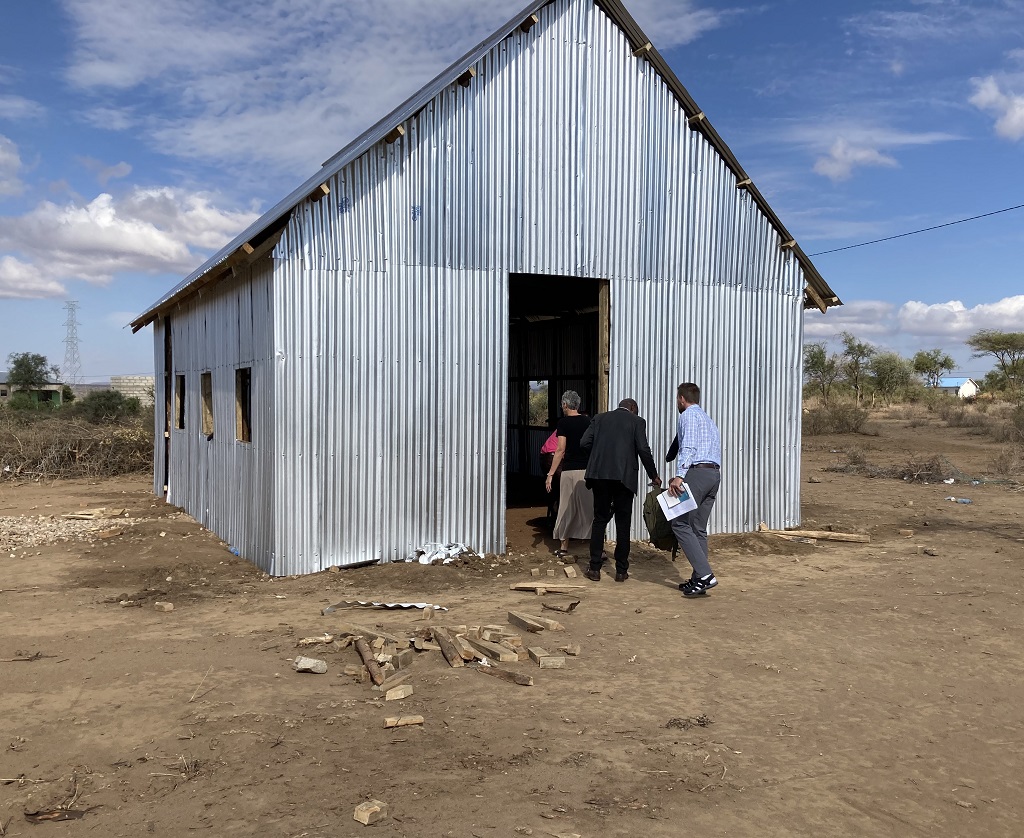

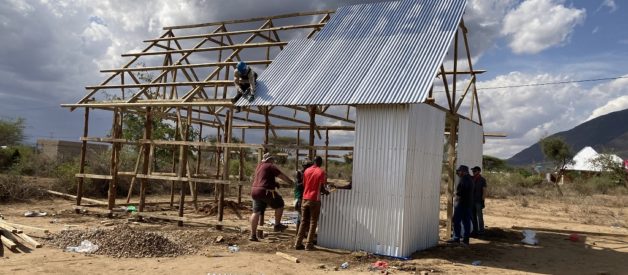
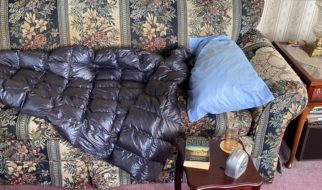
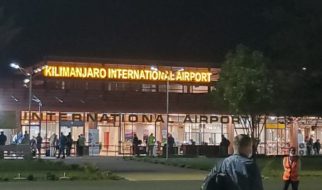
Brenda+Murphy
May 13, 2022Wow, that is amazing how everyone could work as a team and get the whole thing up that quickly, definately a testimony of God’s great power! That kind of experience, the whole mission trip, changes who we are to our core. I’m so glad you got out of your comfort zone and made it happen (even if some of that was being pulled along, lol). That’s awesome!
CW Spencer
May 13, 2022Thanks Brenda. Yeah, comfort zones are safe but kinda boring sometimes.